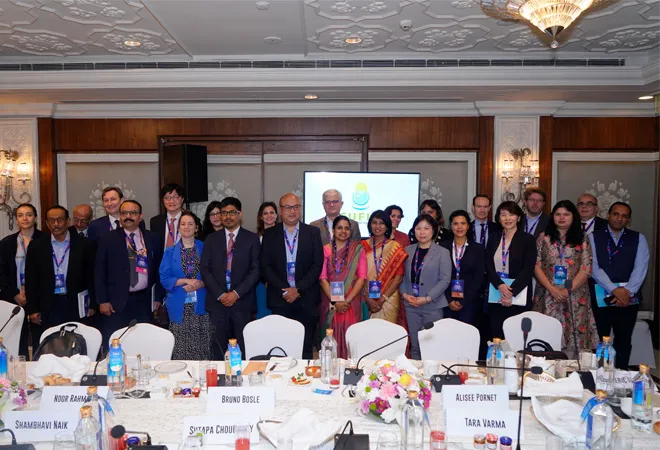The Indo-Pacific has emerged as the world’s economic and geopolitical hub and the center of global power and wealth. Broadly defined as the interconnected space between the Indian Ocean and the Pacific Ocean, it comprises of almost 40 countries. The region accommodates about 65 percent of the world population, accounts for 63 percent of the world GDP, and around two-thirds of world trade moves through the region. Although the region faces a number of shared development challenges owing to its size and geography, the Indo-Pacific narrative has so far been driven by securitisation. The COVID-19 pandemic has further magnified these existing challenges. It has affected much of the global population across continents, with governments and institutions grappling to deal with the devastating social and economic consequences. Moreover, it has set back progress on the 2030 Agenda for Sustainable Development.
Against this backdrop, a was organised on March 4, 2023 at the Raisina Dialogue to mark the launch of Sustainable Finance in the Indo-Pacific (SUFIP) Network, a joint collaboration between the Agence Française de Développement (AFD) and the Observer Research Foundation (ORF). This Network seeks to establish cooperation and knowledge-sharing for strengthening collaboration, and to build coalitions on the development agenda in the region, with a focus on the Indo-French strategic partnership. The discussion, moderated by Dr Nilanjan Ghosh, ORF, pertinently raised key driving points on the challenges and opportunities on sustainable financing faced by this region.
The scene setter of the discussion, Noor Rahman, Joint Secretary (Economic Diplomacy), Ministry of External Affairs, India aptly pointed out the critical role of securing supply chains in the Indo-Pacific, which were badly disrupted during the pandemic. Here, development cooperation plays an important role in facilitating progress on the sustainable development goals (SDGs), such as energy transition, food security, gender etc. Trilateral initiatives, for instance, the recent one kicked off by India, France and the UAE to undertake projects in Africa, or India and Australia being involved in the Pacific islands could prove to be useful. Philippe Orliange, Executive Director, Geographies, AFD, reiterated the imperative role that the Indo-Pacific can play in meeting the goals of the Paris Agreement. However, the discussion shed light on a significant aspect—combining the development and resilience agenda, which urgently need to be put in place for the Indo-Pacific.
Another key aspect highlighted during the discussion relates to channelising the finance. It has been observed that almost US$ 2.4 trillion of investments need to be generated by 2030, out of which US$ 1.4 trillion is required for energy transition. UK Parliamentarian Nicholas Stern rightly pointed out that the financial flows from the multilateral development banks (MDBs) need to scale up and treble in the next five years to deal with the economic repercussions of the pandemic. Here, risk apportionment is necessary. This need to gain traction, particularly in the run up to Agenda 2030.
When it comes to defining the development roadmap of this region, debates are rife on whether there is lack of development finance or absence of bankable projects? As pointed out by one of the experts from the Asian Development Bank (ADB), there is a lack of an enabling environment and risk-sharing when it comes to distribution or allocation of finance. Similarly, private sector players appear to be more interested in taking up climate change mitigation projects vis-à-vis adaptation. There is a need for risk management when it comes to monitoring the flow of revenues. Moreover, engaging with public development finance institutions (DFIs) is crucial since they are in touch with the grassroots reality. One also needs to utilise the right channel to identify public projects that might already be in place.
Another critical angle raised by Sachiko Imoto, Senior Vice President, Japan International Cooperation Agency (JICA), Japan pertains to the lack of dialogue between the donor and recipient countries. In fact, bilateral talks do take place between the partner countries but not with recipients. This can also be attributed to several reasons; one of them being conflict of interest or geopolitics. Moreover, governments are not keen to borrow for adaptation because it does not create cash. It also came to the fore that there is an unhealthy competition between donor players with projects facing the negative after effects.
In fact, the increasing tendency to politicise development projects could deeply affect the sustainability progress of several of the smaller nations of the Indo-Pacific, as pointed out by an expert from Bangladesh. As observed, many pockets in the small island developing states (SIDS), such as Papua New Guinea, face severe governance challenges making it difficult for sustainable finance to penetrate. There are numerous political impediments encountered by the recipient nations questioning their capacity to absorb projects.
One of the key takeaways of the discussion highlighted the mismatch in how a project is defined by the DFIs and how it is interpreted by the recipient countries. Convergence can be brought if all the stakeholders, including the civil society, development practitioners and the DFIs are brought together at the table.
The views expressed above belong to the author(s). ORF research and analyses now available on Telegram! Click here to access our curated content — blogs, longforms and interviews.
